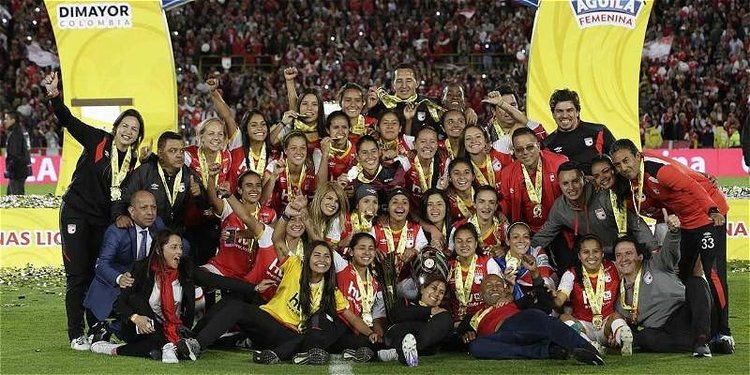BFF: BRIGHT FEMININE FUTURE Full stadiums and amazing atmosphere, how did the Colombian women's league became a success since day one?
Football in South America is a religion.
South America is probably the only region in the world that you can see female football fans as much as male ones. While in most parts of the world football is being caught as a men's game, in South America the passion for the game and for a favorite club are belong to both genders. Despite their 'football culture' and unlike the United States and other European countries, the women's football is far from being compared to men's game. Although most of the South American countries have women's football leagues, they are mainly unprofessional and certainly doesn't attract interest. Colombia decided to change it.
Earlier this week, at El Campin stadium in Bogota, the 2nd leg of the women league final took place, involving Independiente Santa Fe and Atletico Huila.
It was the final match of the first ever Colombian women's professional football league. How successful was this league in its debut year? The stadium was almost full with capacity of 33,327 people, the second best attendance ever for a women football match. Just for comparison, the highest attendance in a local women match was recorded in England, 35,271 people. Without a doubt, phenomenal success of the organizing committee, and for Colombian women football.

El Campin stadium before the final. Almost set a new attendance world record (@infoHuila)
Even though it was only the first year of the professional league, women playing football in Colombia is a common phenomena. Unfortunately, until this year they usually played for fun, passion or as a hobby, but didn't earn anything and surely couldn't consider it as a 'job'. Now, since the professional league has been founded and the headlines about the final match were spread across the globe, there's a hope for young girls who would like to fulfill their dreams as professional footballers.
The compliments for that should be given for the Colombian league management, which called Dimayor. They turned their vision for women's league in to reality, and moreover signed an agreement with the leading sports channel in the country, Winsports, to broadcast live at least one game per week. Broadcasting the games will give much more exposure for the players and the league, which may help to bring more interest by fans and sponsors to in women's football. Furthermore, Dimayor requires each club to operate a professional women team, until 2019.
Nation is First
Serious interest in women's football in Colombia began only 10 years ago. Until then, the Colombian women's game was weak and failed to attract any interest. Their only chance to change it was an international success. When the national honor is on the line, a common situation in South America, everything is possible.
In 2008, Colombia U-17 national team managed to win the South American championship for the first time and qualified to the U-17 World Cup. Two years later, the same players were also part from the U-20 national team that reached the U-20 World Cup semi-final. In both tournaments, the national team had more support from new fans that were introduced to the anonymous but talented players.

The success of the national team pushed to create a professional league (fcf.com.co)
Despite the success of the national team, women’s football in Colombia did not took off, in manners of popularity and organization, so fast. Talented players such as the Ariza twins and Lady Andrade have left Colombia in order to play in the United States, while others such as Yoreli Rincon, Nicole Regnier and Natalia Gaitan have left to Europe. Yet, these performances with the national team made the players known by the Colombian public.
In 2011, the ‘gold generation’ manage to qualify with Colombia senior team to the World Cup, for the first time ever. The team finished second in the Copa America, which also was the qualifiers tournament for the World Cup. The fans that already knew the players became true supporters, and the love for the women national team spread through social networks. It had the taste of a national mission and their matches were broadcast live in national television. It wasn't at the same level of the men's team, but the players clearly felt the love and support, something they never had before.
Four years later, in 2015, Colombia finished once again 2nd in the Copa America and qualified to the World Cup for the second consecutive time. This time the improvement could be seen, as the Colombians beat the mighty French team 2-0 and drew with Mexico. It was the same national team who played in the Olympic tournaments of 2012 and 2016, where they managed to drew 2-2 against USA, one of the best teams in the world. At that time, Colombia have reached the 22nd place in FIFA World Ranking. It is their highest ranking ever, and they hold on it nowadays too.
.jpg)
Captain Natalia Gaitan is celebrating the victory over France with Lady Andrade (FIFA)
Creating the First Pro Women League Ever
The success of the national team convinced the directors of Dimayor that a professional league for women is needed. On April 2016 they decided to establish a new league which will be a good basis for the future of the national team and also expose the football to more young girls that wish to become professionals. Most clubs voted for the league but unexpectedly the major clubs in the country, such as Independiente Medellin, Deportivo Cali, Millonarios, Junior, Once Caldas and Atlético Nacional, which is the pioneer of the women football in Colombia, were against. While Millonarios said that they are having financial difficulties to operate a women team, the other teams couldn’t reach an agreement with the Dimayor about the TV rights incomes and decided not to register their women teams to the league. The clubs' decision had a big affect on the young players in these clubs.
The League system
The first match ever took place on last February, when Cortulua won Deportivo Pasto 2-1. The league includes 18 teams divided into three groups of six teams each. First round played in a double round-robin system with 10 games for each team, played home and away. The first two teams of each group, alongside with the best two teams to finish in 3rd place, are advanced to the quarter final. The playoffs played in two-leg matches series, but without the away goal rule. In case of a draw, the winner been decided by a penalty shootouts. At the end of the season, the champion will qualify for the 2018 Copa Libertadores and will face La Liga champions, Atlético de Madrid for a Hispanoamericano cup clash. Leicy Santos and Lady Andrade were among the league’s best players, while Bucaramanga’s Manuela Gonzalez was the top scorer of the tournament with 13 goals.
.jpg)
The logo of the new women’s football professional league (Dimayor)
So What’s Next?
Now we’ll have to wait and see how the league will develop in the next few years. The final match certainly made huge expectations for the future, not only in Colombia but worldwide as well. Dimayor already made an important step, in signing a new broadcasting agreement with Fan Network TV, which will broadcast almost 90% of the matches in the league to Europe, Asia and North America. This will surely increase the league's exposure, and the chances for more Colombian players to move and to play abroad. Dimayor consider to create a 2nd division, which will allow relegation and promotion, hoping that it will add more interest to the league. Above all these, the main question is preserved. Will the major clubs join to the league and cancel their ultimatum to Dimayor? If so, it will be important for their players, that deserve to play in this league.
If all these things will connect, and the Colombian scene will continue to thrive - don’t be surprised if Colombia will be among the most improving national teams in the next World Cup in 2019. Suerte Cafetéras!
.jpg)
Independiente Santa Fe is the first champion of the women’s football professional league (Héctor Fabio Zamora)
Idan Seggev is a Colombian football passionate and the moderator of the forum bigsoccer.com, Colombian section. He also the owner of the Colombian football blog ColFootball. He can be reached in Facebook and Twitter.